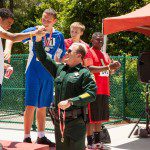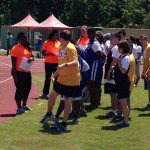The Special Olympics Florida 2014 State Summer Games successfully concluded in Orlando on Saturday, where some 2,000 athletes in their teens, 20s, 30s and up, all with intellectual or cognitive disabilities, competed in a variety of different sports, including track and field, tennis, cycling and soccer. The two-day event, staged at ESPN Wide World Sports at Walt Disney World Resort, is the largest single event offered by Special Olympics Florida.
With thousands of athletes, coaches and family members in attendance, organizers say, Special Olympics Florida would not exist without the army of volunteers who give of their time, energy, dedication and commitment year-round and on the day of events, working at various levels and filling a wide variety of roles in the programs.
Dan Newlin – Humbled to participate in Special Olympics
Prominent Central Florida attorney Dan Newlin knows only too well the importance of volunteering at Special Olympics events – he has been volunteering for the last five years. But on Saturday, Newlin proudly joined other local law enforcement officers, functioning for the first time, as an Orange County Reserve Deputy Sheriff at the Summer Games.
“It’s great to be here today working with the kids, doing high fives and giving big hugs,” said Newlin, who easily embraced his role as he escorted athletes, provided security and awarded medals. “This is important to me personally to be able to give back to the community and to be a part of these kids’ lives in a very special way.”
Like others who volunteer at Special Olympics, Newlin joins an ‘international family of people from all walks of life who gain a greater understanding and appreciation for people with intellectual disabilities through their participation.’ And he is very mindful of this and very humbled by the opportunity to participate.
“Just one minute that you spend with a child here today, may provide that opportunity to make a life time impression,” he said. “And watching these kids run a mile with disabilities, seeing them struggle and fight to make it to the finish line – that’s a rewarding experience. To be a part of that is also very priceless.”
Not too young to be involved with Special Olympics
While Newlin understands the value of participating in Special Olympics to help change people’s attitudes to those with special needs, he also wants his young daughter, Alexis, who also attended Saturday’s Summer Games, to appreciate that people with intellectual disabilities could inspire hope, dignity and courage. Just 10 years old, he believes that Alexis’ involvement in these kinds of activities will help keep her well-balanced and grounded.
“It’s important for young people and children like my daughter to be involved at an early age,” he said. “Even though she [Alexis] is only 10 years old, it’s been wonderful for her – she’s been talking to and cheering on the kids and really enjoyed being a part of the Summer Games. Besides, events like this help her understand what it means to be humble.”
An Excited Special Olympics Winner
It’s hard not to get caught up in the Games watching the athletes meet and surmount daunting obstacles many of us take for granted, as family, friends and volunteers continuously cheered them on.
Jordan Karpel, 27, from Fort Myers, who has been competing in the Special Olympics since 2005, is just as excited today, as he was back then. Draped around his neck, he proudly displays two silver medals for his second place finish in the 800 meters and 3K.
“I’ve done really good and I think that we might just win the gold in the 4×400 relay,” he said with great pride. Like Jordan, his unified runner Thomas Gargano, thinks that despite the competition, the team stands a good chance of pulling off the gold.
Jordan said he does track and field practice after school, every week, every year and is already looking forward to next year’s games. But before, he’ll compete in bowling in the Special Olympics in the fall.
Proud Parents
Jordan’s parents, Sindee and Larry Karpel, couldn’t be more proud of their son’s accomplishments and progress since he began competing in the Special Olympics.
“It’s amazing, we’ve come a very, very long way and he has progressively moved up,” said Sindee. “He broke 3 minutes on his 800 meters and we are very, very proud of him.”
The Karpels said, with a lot of hard work Jordan’s ability to focus has improved tremendously. They give a lot of credit to Jim McCaughan, Lee County Special Olympics Track Team Coach and to team work and socialization which help them all to grow.
Dedicated Track Coach
McCaughan said, every year over 40 athletes begin practicing in January and each looks forward to making it to the State Special Olympics. Eight athletes qualified this year.
“Just being here is a special event in their lives, it’s really a joy,” said McCaughan, a 15-year veteran coach. “I couldn’t do this without the help of other student athletes who compete in unified races and give up their Saturday mornings for 5½ months…they’re great kids too.”
McCaughan also had high praise for the parents of special needs kids who accompanied them to the Games and for the active role they play in helping them grow and develop. We are all here as a family, we are more than a team, he said.
Passion and Commitment for Special Olympics
Amanda Wyandt, Awards Program Coordinator for the State Summer Games, has been involved with Special Olympics for over 20 years, as a coach and Lee County Coordinator. She was drawn to special needs kids very early on when she observed her aunt care for a family member who was developmentally challenged, but institutionalized. She is adamant that special needs athletes be coached like any other athletes.
“Our athletes are athletes and ought to be trained the same way you would all other athletes,” said a passionate Wyandt. “Yes, they do have some disabilities, maybe a little bit different, but that doesn’t mean they should be trained differently.”
She highlighted some of the scores that special needs athletes achieved to emphasize her point – a young male marathon runner who did the 10K meters in 51 minutes on Friday. Most averages are 1½ hours, she says.
Wyandt laments that more often than not, special needs kids who attend school are disregarded and don’t get an opportunity to participate with their peers. The Special Olympics programs which are year round and free, give them the opportunity to show the world what they can do.
“It doesn’t matter if they are special needs. They have abilities that people don’t take into consideration and they should be treated as equals,” she said.














